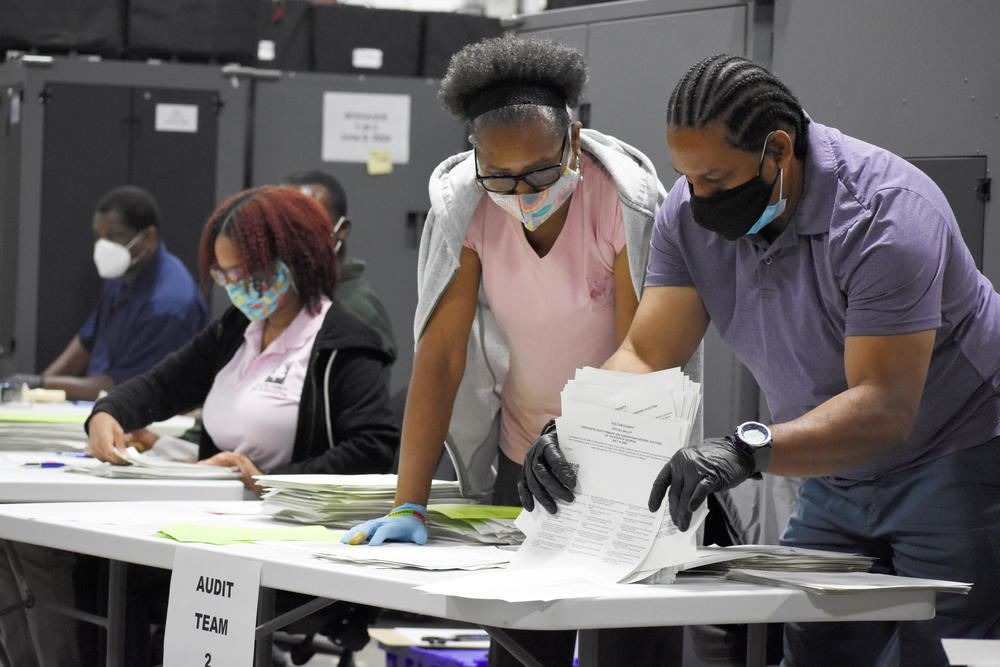
Caption
Fulton County election workers sort absentee ballots during a pilot audit after the June 9 primary.
Credit: Stephen Fowler | GPB News

Fulton County election workers sort absentee ballots during a pilot audit after the June 9 primary.
The Georgia Senate Ethics committee approved a number of elections bills Thursday, including a measure adding an ID requirement to absentee applications and a proposal to require counties to process mail-in ballots earlier, as more extreme bills wait in the wings.
While Republican lawmakers in the chamber have filed several pieces of legislation that would make voting harder for Georgians, some of the bills now sent to the Senate floor contain smaller changes with broader support.
SB 40, proposed by Democratic Sen. Jen Jordan (D-Atlanta), would require county officials to begin processing absentee ballots eight days before Election Day, codifying a pair of emergency State Election Board rules enacted in 2020 seeking to cut down on delays in counting an overwhelming number of mail-in ballots in the November and January elections.
"I think we saw the backup and how long it took to actually process [ballots], which of course ended up causing a lot of consternation for folks around the state by the time we got to the January runoff," Jordan said. "All this bill does is try to get in line with that so counties can pre-process, not tabulate, absentee ballots."
The original bill allowed counties to start early, but was amended to make it mandatory. It passed unanimously.
Another bill, SB 67, streamlines the absentee ballot application process and ends signature verification on those applications. Instead, voters requesting a ballot using a paper form would need to use their driver's license number, state ID number, or supply a copy of an acceptable form of photo ID in order to receive a ballot.
A new online portal enacted by the secretary of state's office already requires driver's license or state ID number, and in-person voting requires a registered voter to show one of several forms of photo ID in order to cast a ballot.
Sponsor Sen. Larry Walker (R-Perry) said that this requirement would provide more security to the absentee voting process without placing an undue burden on voters.
"We don't want to put obstacles in the way of legitimate people voting," he said. "But I think it's important that we have security in the vote and confidence from the public in the vote security."
Other Republicans on the committee pointed out that Georgians can get a state ID card for free from a county elections office or Department of Drivers Services.
Sen. Ed Harbison (D-Columbus) expressed concern about maintaining the privacy of information sent in paper forms.
"Who has access ... somebody could take that and do whatever they want and do some fraud with that kind of thing," he said. "I know you're trying to cure a problem in your mind, but the truth of the matter is I think you're opening that privacy door."
That bill passed along party lines.
Other measures that were approved raised questions from Democrats on the committee about the necessity of the legislation, such as SB 184 sponsored by Sen. Bill Cowsert (R-Athens) that would shorten the time county elections officials have to input voter credit into the state's system from 60 days to 30 or face a $100-a-day fine.
"In the process of drafting this bill, did you speak with election directors in local communities to make sure they can meet this deadline?" Sen. Sally Harrell (D-Atlanta) asked.
Cowsert said he did not, but responded that no elections director had approached him or complained since the bill was filed earlier this week.
SB 89 would create the position of an Elections Assistance Officer in the secretary of state's office that is selected by the State Election Board. That officer would work with local elections offices on training and evaluating voting processes, and also identify low-performing county elections directors and take action against those superintendents that don't meet standards.
But in many counties, under Georgia law the election superintendent is a bipartisan appointed election board, while the elections director is a hired position. The language of this bill would authorize the state to revoke power from those election boards and not the directors, which seems to be different from the bill's intent.
The committee also approved a measure that would require an online election results portal to also contain a number of absentee data points, including the number of ballots requested, returned and rejected.
"Citizens have the right to know what's the total number of votes cast and what's the types of votes," Cowsert said. "And you ought to be able to know that by the close of business on Election Day."
But the bill also requires elections officials to wait until they have the total number of in-person ballots cast, the number of absentee ballots received as of the close of the polls and the number of provisional ballots cast before posting any election results. This would likely delay results, especially in larger metropolitan counties that have more memory cards to upload, more absentee ballots to process and adjudicate and provisional ballots to certify. Additionally, the deadline for provisional ballots to be cured is three days after the election, so it is unclear if results would have to wait until then.
A proposal to eliminate no-excuse absentee voting was passed out of a subcommittee this week but not placed on the agenda.